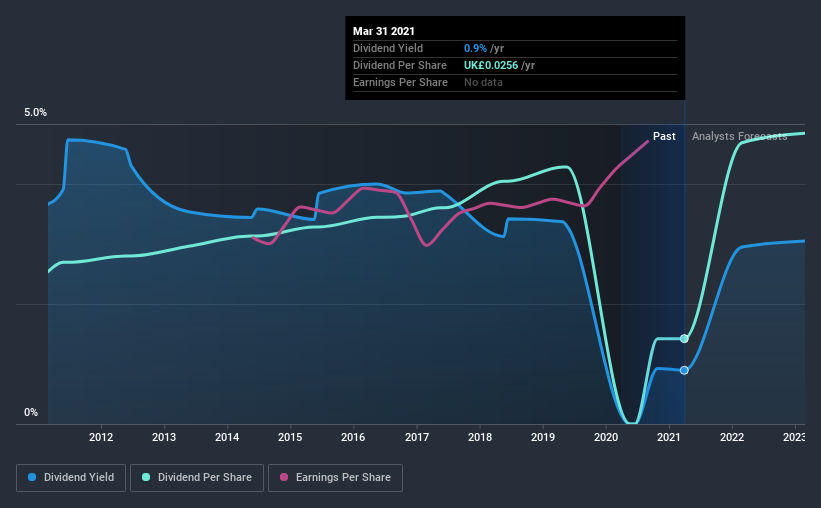- United Kingdom
- /
- Media
- /
- LSE:BMY
What To Know Before Buying Bloomsbury Publishing plc (LON:BMY) For Its Dividend

Could Bloomsbury Publishing plc (LON:BMY) be an attractive dividend share to own for the long haul? Investors are often drawn to strong companies with the idea of reinvesting the dividends. If you are hoping to live on your dividends, it's important to be more stringent with your investments than the average punter. Regular readers know we like to apply the same approach to each dividend stock, and we hope you'll find our analysis useful.
A slim 0.9% yield is hard to get excited about, but the long payment history is respectable. At the right price, or with strong growth opportunities, Bloomsbury Publishing could have potential. There are a few simple ways to reduce the risks of buying Bloomsbury Publishing for its dividend, and we'll go through these below.
Explore this interactive chart for our latest analysis on Bloomsbury Publishing!

Payout ratios
Dividends are typically paid from company earnings. If a company pays more in dividends than it earned, then the dividend might become unsustainable - hardly an ideal situation. Comparing dividend payments to a company's net profit after tax is a simple way of reality-checking whether a dividend is sustainable. Bloomsbury Publishing paid out 8.5% of its profit as dividends, over the trailing twelve month period. We like this low payout ratio, because it implies the dividend is well covered and leaves ample opportunity for reinvestment.
We also measure dividends paid against a company's levered free cash flow, to see if enough cash was generated to cover the dividend. Bloomsbury Publishing's cash payout ratio last year was 4.4%, which is quite low and suggests that the dividend was thoroughly covered by cash flow. It's positive to see that Bloomsbury Publishing's dividend is covered by both profits and cash flow, since this is generally a sign that the dividend is sustainable, and a lower payout ratio usually suggests a greater margin of safety before the dividend gets cut.
While the above analysis focuses on dividends relative to a company's earnings, we do note Bloomsbury Publishing's strong net cash position, which will let it pay larger dividends for a time, should it choose.
We update our data on Bloomsbury Publishing every 24 hours, so you can always get our latest analysis of its financial health, here.
Dividend Volatility
From the perspective of an income investor who wants to earn dividends for many years, there is not much point buying a stock if its dividend is regularly cut or is not reliable. For the purpose of this article, we only scrutinise the last decade of Bloomsbury Publishing's dividend payments. Its dividend payments have declined on at least one occasion over the past 10 years. During the past 10-year period, the first annual payment was UK£0.05 in 2011, compared to UK£0.03 last year. This works out to be a decline of approximately 5.6% per year over that time. Bloomsbury Publishing's dividend has been cut sharply at least once, so it hasn't fallen by 5.6% every year, but this is a decent approximation of the long term change.
We struggle to make a case for buying Bloomsbury Publishing for its dividend, given that payments have shrunk over the past 10 years.
Dividend Growth Potential
With a relatively unstable dividend, and a poor history of shrinking dividends, it's even more important to see if EPS are growing. Bloomsbury Publishing has grown its earnings per share at 6.0% per annum over the past five years. A low payout ratio and strong historical earnings growth suggests Bloomsbury Publishing has been effectively reinvesting in its business. We think this generally bodes well for its dividend prospects.
We'd also point out that Bloomsbury Publishing issued a meaningful number of new shares in the past year. Regularly issuing new shares can be detrimental - it's hard to grow dividends per share when new shares are regularly being created.
Conclusion
When we look at a dividend stock, we need to form a judgement on whether the dividend will grow, if the company is able to maintain it in a wide range of economic circumstances, and if the dividend payout is sustainable. Firstly, we like that Bloomsbury Publishing has low and conservative payout ratios. Unfortunately, earnings growth has also been mediocre, and the company has cut its dividend at least once in the past. Overall we think Bloomsbury Publishing is an interesting dividend stock, although it could be better.
It's important to note that companies having a consistent dividend policy will generate greater investor confidence than those having an erratic one. Still, investors need to consider a host of other factors, apart from dividend payments, when analysing a company. For instance, we've picked out 1 warning sign for Bloomsbury Publishing that investors should take into consideration.
We have also put together a list of global stocks with a market capitalisation above $1bn and yielding more 3%.
If you decide to trade Bloomsbury Publishing, use the lowest-cost* platform that is rated #1 Overall by Barron’s, Interactive Brokers. Trade stocks, options, futures, forex, bonds and funds on 135 markets, all from a single integrated account. Promoted
Valuation is complex, but we're here to simplify it.
Discover if Bloomsbury Publishing might be undervalued or overvalued with our detailed analysis, featuring fair value estimates, potential risks, dividends, insider trades, and its financial condition.
Access Free AnalysisThis article by Simply Wall St is general in nature. It does not constitute a recommendation to buy or sell any stock, and does not take account of your objectives, or your financial situation. We aim to bring you long-term focused analysis driven by fundamental data. Note that our analysis may not factor in the latest price-sensitive company announcements or qualitative material. Simply Wall St has no position in any stocks mentioned.
*Interactive Brokers Rated Lowest Cost Broker by StockBrokers.com Annual Online Review 2020
Have feedback on this article? Concerned about the content? Get in touch with us directly. Alternatively, email editorial-team (at) simplywallst.com.
About LSE:BMY
Bloomsbury Publishing
Bloomsbury Publishing Plc publishes academic, educational, and general fiction and non-fiction books for children, general reader, teachers, students, researchers, libraries, and professionals worldwide.
Solid track record with excellent balance sheet and pays a dividend.
Similar Companies
Market Insights
Community Narratives




